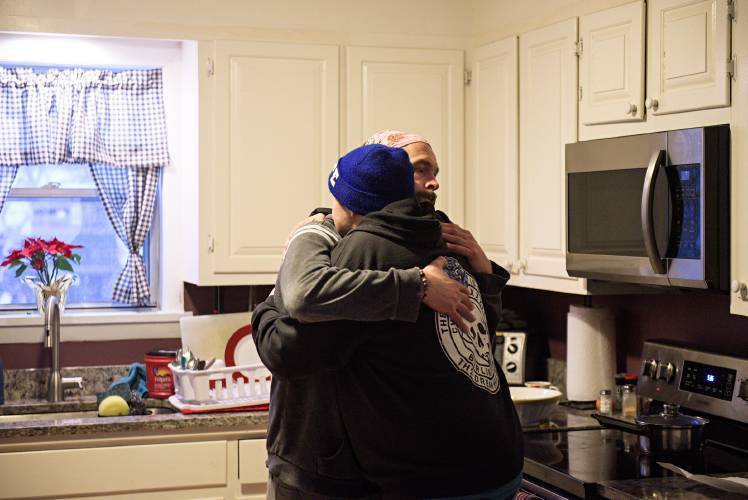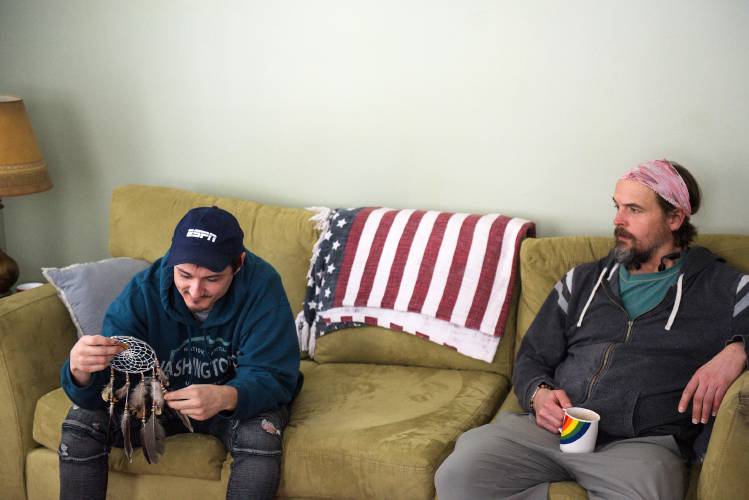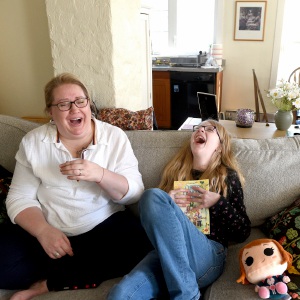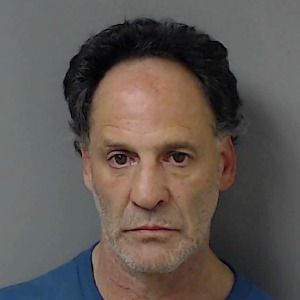New Hampshire municipalities consider changes to encourage or discourage housing development
|
Published: 02-28-2025 5:02 PM
Modified: 03-02-2025 9:38 AM |
LEBANON — Even as the New Hampshire Legislature attempts to dial back municipalities’ control over zoning, several Upper Valley communities will vote on changes aimed at both spurring and slowing development in their municipalities this Town Meeting.
Lebanon has three proposed zoning amendments on the municipal ballot this year, all of which attempt to encourage housing development in the city.
A handful of other Upper Valley New Hampshire towns also have housing-friendly zoning changes on their town warrants:
The Enfield Planning Board is proposing allowing two-family homes in rural residential districts and adding a definition of accessory dwelling unit, or ADU, to their zoning ordinance which raises the maximum allowed size of conditioned space for an ADU from 800-square-feet to 1,200-square-feet.
Croydon has an amendment to allow detached ADUs in addition to attached ADUs, which are already allowed for any single-family home under a 2017 state law.
However, the Croydon Town Meeting warrant also contains four proposed zoning amendments, submitted by petition, intended to slow housing development in the rural town of about 850 people.
“It has nothing to do with control and limiting growth,” Planning Board Chairman Jim Morgan said in a phone interview. “It has everything to do with managing growth.”
Meanwhile, at the state level, there is bipartisan support for dialing back local municipalities’ control over zoning.
Article continues after...
Yesterday's Most Read Articles
House Bill 459, proposed by state Rep. Joe Alexander, R-Goffstown, prohibits minimum lot sizes in single-family residential districts that are larger than “necessary for community health and safety, given sewer infrastructure,” the bill says.
If passed, municipalities could not set a minimum lot size for lots with their own septic and well, that is bigger than what the New Hampshire Department of Environmental Service requires for individual sewer systems, the bill states.
Lots on town water could not be required to be bigger than half an acre. That would void one of the proposed amendments on Croydon’s warrant, which asks to increase the minimum lot size for single-family homes in the rural residential district from 3.5 acres to five acres and road frontage from 200 feet to 300 feet.
However, towns could keep larger lot sizes if they can provide “empirical evidence that the health or safety of the community will be meaningfully impacted without the ability to require larger lot sizes,” says the bill.
“The current New Hampshire Legislature is making rules to loosen zoning and housing restrictions but aren’t taking into consideration the small towns that can’t handle rapid growth,” Morgan said. “Those communities suffer.”
The debate about who ought to dictate how communities develop comes in the midst of a housing crisis. New Hampshire continues to experience a shortage of not only affordable housing, but housing in general.
The Upper Valley Lake Sunapee region has a target of 5,671 new housing units by 2040 based on population projections, according to the 2023 Regional Housing Needs Assessment. Sparsely populated Orange is projected to need the fewest units at 26, and Lebanon the most at 1,102 units. These figures include both single-family homes and apartments.
The first Lebanon zoning amendment on this year’s ballot asks voters to approve a “Pattern Zones Overlay District” in downtown Lebanon and West Lebanon to increase housing density, while preserving the historical characteristics of the areas.
Property owners in the downtown areas looking to build new homes would be able to utilize pre-made, free, architecturally designed plans that already have city approval and match the existing style of the districts.
“We’re promoting more housing opportunities in a fiscally responsible and sustainable way without destroying the architectural integrity of our neighborhoods,” Lebanon Planning and Development Director Nathan Reichert said in a phone interview.
The March 11 municipal ballot is the first time residents will get a chance to vote on the project, but there have been several community outreach campaigns and public hearings over the past three years. The project has been underway since 2022, when the city applied for a Housing Opportunity Planning Grant, a form of state funding municipalities can utilize to hire consultants for planning projects.
“It’s something that folks have been very understanding of because there’s too many people and not enough houses,” Reichert said. “It’s not affordable or sustainable.”
If the zoning amendment passes, Lebanon will be the first municipality in New England to have a Pattern Zones Overlay District, Reichert said.
The next step would be for the city to contract with local architects to draw up a pattern book of about 20 plans for smaller cottage-style houses all the way up to triplexes that will all hopefully cost no more than $350-per-square-foot to construct, Reichert said. Lebanon also hopes to loop in local housing supply and construction companies to modularize the homes.
This summer, the city plans to begin construction on a cottage development on Barrows St. off of Route 10. The development will include five housing units built on city-owned land and the plans for the cottages are expected to be included in the pattern book of plans to choose from.
Zoning Amendment two’s intent is to fill a gap in the Upper Valley substance use disorder recovery ecosystem by allowing for the establishment of certified “recovery houses” by special exception in residential districts one, two and three.
Headrest, a Lebanon-based nonprofit that assists those affected by substance use disorder, has entered an agreement to purchase property to create Lebanon’s first certified recovery house if the zoning amendment passes.
A recovery house is a substance-free home for people in recovery from substance use disorder. It is often a step-down from inpatient treatment while still offering peer-to-peer support and a sober environment.
“The demand for recovery housing is here,” Lebanon Human Services Director Lynne Goodwin said in a phone interview.
There are many substance use disorder resource centers in the Upper Valley. Each center offers different services ranging from crisis hotlines to residential treatment to outpatient counseling.
There are, however, currently only a handful of certified recovery houses. Turning Point operates two in White River Junction and Claremont has Sullivan House and Hope 2 Freedom’s women’s and men’s homes.
Goodwin pointed out that when a resident’s life is based in Lebanon, it’s not easy to relocate to White River Junction or Claremont, especially without reliable transportation.
Headrest’s recovery house would have room for up to 14 residents who would receive support from an onsite Headrest peer leader, be expected to pay a weekly fee and remain employed and sober, said Matt McKenney, the chairman of the nonprofit’s board.
The final proposed zoning amendment on Lebanon’s municipal ballot asks voters if they are in favor of rezoning the Alice Peck Day Memorial Hospital campus from a residential-three district to a medical center-two district to allow the hospital “enhanced flexibility for continued hospital operations, including the opportunity to provide needed staff housing,” according to the description of the amendment on Lebanon’s website.
“This zoning update will better reflect how our property has been used since 1927 and will allow future flexibility as healthcare delivery and staffing needs continue to evolve,” Susan Mooney, President and CEO of the hospital said in an email to the Valley News.
The hospital has no active plans in place to create workforce housing, Mooney said.
In Croydon, petitions for several warrant articles began circulating after a large property on Winter Street was sold and rumors of a 100-trailer mobile home park being proposed on the lot in the rural residential district started spreading.
“A lot of residents in town panicked,” Morgan, who signed three of the petitions said.
Article 16 calls for a one-year moratorium on all subdivisions in the rural residential district “while the Town updates its Master Plan and implements a capital improvement plan for the purpose of establishing a growth management ordinance.” The town’s Master Plan has not been updated for 30 years, Morgan said.
Article 17 asks to increase the minimum lot size for single-family homes in the rural residential district from 3.5 acres to five acres and road frontage from 200 feet to 300 feet.
In a similar vein, article 23 would increase the minimum setback in the rural residential district from 35 feet to 75 feet and in the village district from 35 feet to 45 feet.
Finally, article 19 asks voters if they wish to disallow mobile home parks in the rural residential district.
“We have no police, a volunteer fire department and a one-room schoolhouse that’s 15 children away from capacity,” Morgan said. “The town cannot support that amount of growth that quickly.”
Currently, mobile home parks are only allowed in residential districts by special exception, but residents “didn’t like the loophole,” Morgan said.
Resident Brenda Williams started the petition for article 19. “If we had a mobile home park in this town, we don’t have the infrastructure to support that,” she said in a phone interview. “It would just be a total mess if you ask me.”
Lebanon residents can vote on the zoning amendments on Tuesday, March 11, from 7 a.m. to 7 p.m. Polling locations are online at: https://lebanonnh.gov/583/Find-Your-Polling-Location.
Croydon residents can vote on the proposed zoning amendments at Town Meeting on Saturday, March 15, starting at 9 a.m. at the volunteer fire department located at 828 Route 10.
Emma Roth-Wells can be reached at erothwells@vnews.com at 603-727-3242.












 After four decades collecting carts, Ricky Tewksbury will retire when Shaw’s closes mid-April
After four decades collecting carts, Ricky Tewksbury will retire when Shaw’s closes mid-April Lyme family anxious as town considers selling rental property
Lyme family anxious as town considers selling rental property Sununu says he’s not running for US Senate
Sununu says he’s not running for US Senate  Hartford man dies while incarcerated
Hartford man dies while incarcerated 
